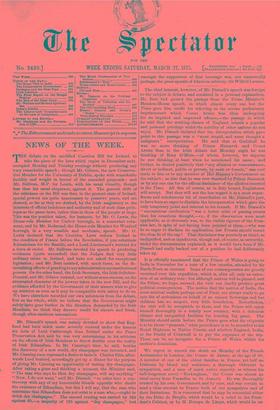NEWS OF THE WEEK.
fr HE debate on the modified Coercion Bill for Ireland, to
take the place of the laws which expire in December next, occupied Monday and Tuesday evenings without producing any 'very remarkable speech ; though Mr. Gibson, the new Conserva- tive Member for the University of Dublin, spoke with remarkable lucidity and weight in favour of the amended proposals ; and 2.1r. Sullivan, M.P. for Louth, with his usual vivacity, though less than his usual eloquence, against it. The general drift of the criticisms on the Bill was that, in the present state of Ireland, special powers are quite unnecessary to preserve peace, and are clesired, so far as they are desired, by the Irish magistracy in the interests of official indolence and authority and of such class privi- aeges as the game-laws, rather than in those of the people at large. This was the position taken, for instance, by Mr. 0. Lewis, the Home-rule Member for Carlow borough, in a somewhat vehe- ment, and by Mr. Redmond, the Home-rule Member for Wexford borough, in a very sensible and moderate, speech. Mr. 0. Lewis declared that the Coercion Laws reduce Ireland to the condition of France before the Revolution, if you substitute Kilmainham for the Bastille, and a Lord-Lieutenant's warrant for A lettre de cachet. Mr. Sullivan devoted his speech to producing 'evidences (quite unneeded) that the Judges find very little ordinary crime in Ireland, and have not asked for exceptional legislation ; and Mr. Butt insisted, with much force, on the de- moralising effects of grantingto any administration unconstitutional powers. On the other hand, the Irish Secretary, the Irish Solicitor- general, and Mr. Gibson insisted, not without some success, on the Attenuated character of the powers taken in the new Bill, and the 'evidence afforded by the Government of their 'sincere wish to give sip coercion as soon as it may be compatible with safety to do so. We have elsewhere recorded our own inferences from the debate, but on the whole, while we believe that the Government might safely have gone further in the direction demanded by the Irish Members, we think they deserve credit for sincere and frank, though ultra-cautious concessions.


































